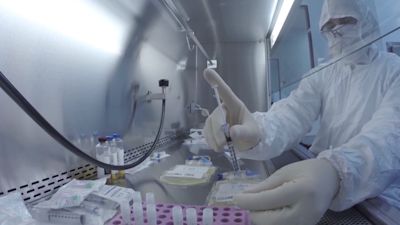Explainer
What is CAR T-cell cancer therapy and how does it work?

Cancer patients across the country are benefitting from a new treatment known as CAR-T therapy.
It was only approved on the NHS in 2018 and involves collecting and using the patients’ own immune cells to treat their condition.
Chimeric Antigen Receptor T-cell, or CAR-T, reprogrammes the body's T-cells to recognise and destroy cancer.
But what exactly is the gruelling treatment and how does it work?
What are T-cells?
White blood cells called lymphocytes play an important part in fighting infection and diseases, including cancer.
There are different types of lymphocytes. T-cells are one type and they move around the body to find and destroy defective cells.
If you come into contact with a new infection or disease, the body makes T-cells to fight that specific infection or disease.
It then keeps some in reserve so that if you come across the infection again your body can recognise it and attack it immediately.
How does CAR T-cell therapy work?
T-cells are good at fighting infection, but it can be difficult for them to tell the difference between a cancer cell and a normal cell.
CAR T-cell therapy changes the T-cells to try and get them to recognise certain types of cancer.
A medical team will take a sample of T-cells from the blood, then reprogramme them to recognise and target a specific protein on the cancer cells.
These changed T-cells grow and multiply in the lab. Once there are enough cells they will be put back into the patient's blood stream via a drip.
The aim is for the CAR T-cells to then recognise and attack the cancer cells. Researchers are still looking into how long they might stay in the body.
Who can have CAR-T therapy?
CAR T-cell therapy is available for some children with leukaemia and some adults with lymphoma.
This followed decisions by the National Institute for Health and Care Excellence (NICE) in England in December 2018 and January 2019, and decisions by the Scottish Medicines Consortium (SMC) in 2019.
The decision on which patients are eligible is decided by a panel of expert clinicians following a referral from a specialist doctor.
Where can I have CAR-T therapy?
CAR-T for acute lymphoblastic leukaemia for children and young people up to the age of 25:
Cambridge University Hospitals NHS Foundation Trust
Great Northern Children’s Hospital (Newcastle)
Great Ormond Street Hospital
King’s College Hospital
Leeds Teaching Hospitals NHS Trust
Manchester Royal Infirmary
Queen Elizabeth Hospital (Birmingham)
Royal Manchester Children’s Hospital
Royal Marsden Hospital
The Christie NHS Foundation Trust
University College London Hospital
University Hospitals Bristol NHS Trust
CAR-T for adults with large B-cell lymphoma:
Cambridge University Hospitals NHS Foundation Trust
King’s College Hospital
Leeds Teaching Hospitals NHS Trust
Manchester Royal Infirmary
Newcastle Hospitals NHS Foundation Trust
Queen Elizabeth Hospital Birmingham
Royal Marsden Hospital
The Christie NHS Foundation Trust
University College London Hospital
University Hospitals Bristol NHS Trust